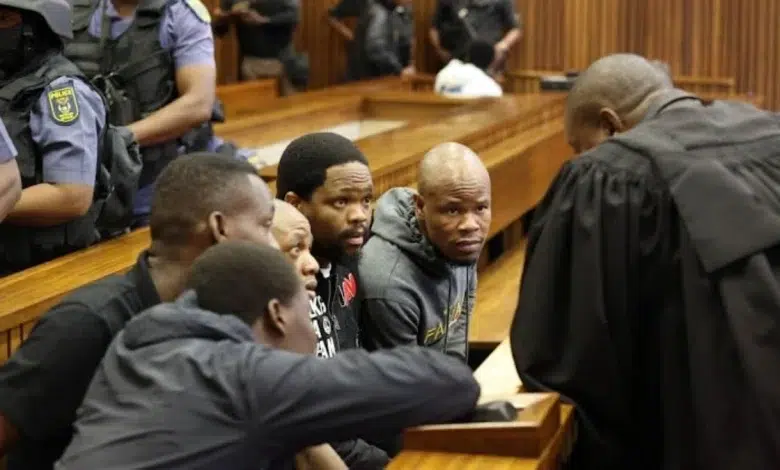Justice for Meyiwa Continues as Maphisa Denies Any Role in Murder

Table of contents
- The Ongoing Trial of Senzo Meyiwa’s Accused
- Background of the Case
- Maphisa’s Denial and Defence Arguments
- The State’s Position
- Understanding the Legal Standard
- Recent Court Developments
- Broader Impact and Public Interest
- Key Evidence Under Scrutiny
- What Happens Next?
- The Pursuit of Justice Continues
- Ensuring a Fair Trial
- A Case That Resonates Nationally
The Ongoing Trial of Senzo Meyiwa’s Accused
The trial of five men accused of murdering South African soccer star Senzo Meyiwa has entered a crucial phase in 2025. Among them, Mthokoziseni Maphisa, identified as accused number four, is challenging the charges against him. The High Court in Pretoria is preparing to rule soon on whether his case should be dismissed. This marks a significant moment in this long-running, highly publicised trial.
Background of the Case
Senzo Meyiwa was fatally shot on 26 October 2014 during a robbery at his girlfriend’s family home. The murder sent shockwaves across South Africa, especially in the sports community. The investigation and subsequent trial have been lengthy and complex. It involves multiple accused and a mix of confessions, forensic evidence, and witness testimonies.
ALSO READ: Rosebank Shooting: Police Confirm Body Found on Bath Avenue
Maphisa’s Denial and Defence Arguments
During the trial, Maphisa’s defence lawyer has argued there is insufficient evidence to link him to the murder. They contest the reliability of the state’s key witness, Constable Sizwe Zungu, citing contradictions and lack of corroboration. The defence holds that no direct proof connects Maphisa to the crime scene. Moreover, they argue it doesn’t demonstrate a shared plan to kill Meyiwa. They also challenge the credibility of confessions and allege that the evidence does not sustain charges beyond reasonable doubt.
The State’s Position
Despite the defence’s assertions, the state maintains its case against Maphisa. Prosecutors argue that cumulative evidence, including the confessions of co-accused, ballistic analysis, and witness accounts, places Maphisa at the scene and involved in the murder. The state contends that his presence and actions during the incident are proven beyond reasonable doubt. Thus, aiming to secure a conviction.
Understanding the Legal Standard
In South African criminal law, the prosecution must prove the accused’s guilt beyond a reasonable doubt. This means the evidence must be so strong that it leaves no reasonable or logical basis to doubt guilt after considering all the facts. It is a high threshold, reflecting the serious consequences of a criminal conviction, such as the loss of liberty. Courts require that no one is convicted unless the evidence is credible, reliable, and sufficient to convince a reasonable person of guilt. If doubt remains, the accused must be acquitted.
Evidence presented in criminal trials can be direct or circumstantial. Direct evidence includes eyewitness accounts or forensic proof such as DNA or fingerprints linking an accused to a crime scene. Circumstantial evidence requires inference, for example, showing the accused had a motive or was present near the crime scene. While indirect, such evidence can establish a compelling case if it consistently supports guilt and excludes reasonable alternative explanations.
However, evidence that is contradictory, lacks credibility, or fails to reliably connect the accused to the offence cannot sustain a conviction. Judges must carefully weigh the totality of the evidence, ensuring that convictions occur only when guilt is proven beyond reasonable doubt. This standard safeguards fairness and protects against wrongful convictions.
Recent Court Developments
In August and September 2025, the court has focused on considering Maphisa’s application to have charges dropped (known legally as a discharge application). The defence’s arguments were thoroughly examined. The state responded firmly in opposition. A judgment on whether Maphisa will continue to face trial is pending. This has significant implications for the case’s progress.
Broader Impact and Public Interest
The trial remains a focal point in the eyes of South Africans, symbolizing broader concerns about justice, accountability, and the criminal justice system’s handling of high-profile cases. Families of victims and sports fans alike are closely following developments. They hope for a resolution that honours Meyiwa’s legacy.
Key Evidence Under Scrutiny
Ballistic experts and pathologists have testified that Meyiwa was shot at close range, consistent with the prosecution’s claims. Additionally, cell phone records and forensic analysis have been presented to support the state’s position on the accused’s movements and involvement. The credibility of witness accounts remains a critical factor in the court’s assessment.
What Happens Next?
The Pretoria High Court is expected to deliver its ruling on Maphisa’s discharge application soon. If the charges are dropped, he will be acquitted. Otherwise, the trial will proceed with the defence calling witnesses to contest the state’s case. This decision will shape the trajectory of the proceedings and potentially affect the outcome.
The Pursuit of Justice Continues
Regardless of the court’s ruling on Maphisa, the broader quest for justice for Senzo Meyiwa remains active. The trial’s pace and transparency hold importance for public trust in the legal process. This demonstrates the commitment to holding those responsible accountable.
Ensuring a Fair Trial
Legal experts emphasize the need for all accused to receive a fair trial based on evidence and proper legal standards. This ensures the integrity of the judicial system is maintained while providing closure for victims’ families and the wider community.
A Case That Resonates Nationally
Senzo Meyiwa’s murder and the ongoing trial continue to resonate deeply within South Africa. The nation watches closely as the court navigates complex evidence and arguments. It aspires to uphold justice and the rule of law.



